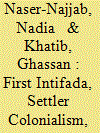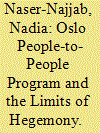| Srl | Item |
| 1 |
ID:
175781


|
|
|
|
|
| Summary/Abstract |
The United Nations Security Council unanimously passed Resolution 1325 on October 31, 2000. This resolution, which focuses on women, peace, and security, calls on member states to “protect women and girls from gender-based violence … in situations of armed conflict;” “adopt a gender perspective” when “negotiating and implementing peace agreements;” increase women’s participation at decision-making levels in conflict resolution and peace processes;” and increase women’s representation “at all decision-making levels in national, regional, and international institutions and mechanisms for the prevention, management, and resolution of conflict.” In this article, I consider how these different imperatives have been addressed in the Palestinian-Israeli context. In particular, I will focus on the 1967 territories and on the response of the Palestinian Authority (PA) to the resolution.
|
|
|
|
|
|
|
|
|
|
|
|
|
|
|
|
| 2 |
ID:
167959


|
|
|
|
|
| Summary/Abstract |
This article engages with the views of prominent leaders from the First Intifada to evaluate the possibility of a Palestinian uprising under existing circumstances. It provides insight into the past and present to establish a basis for contemporary struggle. In acknowledging the fragmentation of Palestinian land and population, the article argues that many of the features that made popular struggle possible during the First Intifada are now clearly absent, requiring a new praxis of resistance.
|
|
|
|
|
|
|
|
|
|
|
|
|
|
|
|
| 3 |
ID:
169256


|
|
|
|
|
| Summary/Abstract |
Reconciliation-based initiatives evoke a substantive and meaningful vision of peace and suggest a form of peace building that is intimately engaged at the personal and social level. This article critically engages with a specific reconciliation initiative, the People-to-People Program (P2PP) that was applied to the Palestinian-Israeli conflict. It uses Gramscian concepts of hegemony, consent, and war of position, with the intention of illustrating that the program functioned as a disciplinary or regulatory device that structured and realigned the agency of its Palestinian participants. In highlighting the different features and dimensions of Palestinian subversion and resistance, it brings out the limits of hegemony.
|
|
|
|
|
|
|
|
|
|
|
|
|
|
|
|